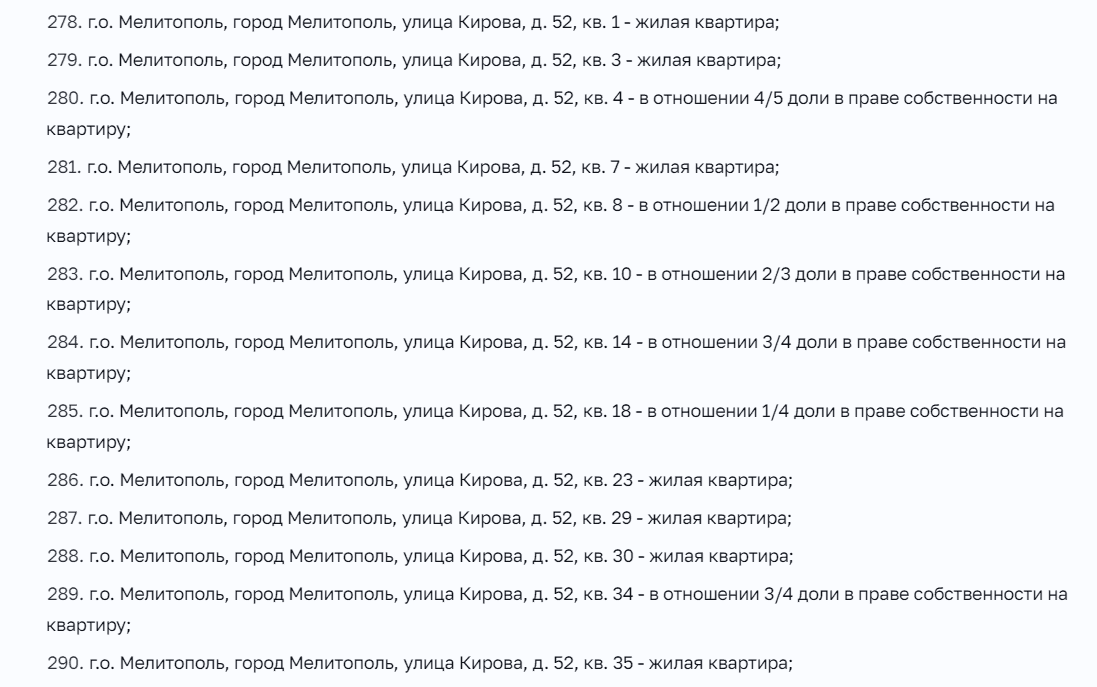

In one week, the occupation administrations published 1030 addresses of housing they are ready to take away from owners
Russian occupation administrations in four Ukrainian regions published at least 1030 addresses of housing “with signs of ownerlessness” in the last week of August 2024.
The respective announcements of the occupation municipal and regional administrations state that the owners of such housing can claim their rights to it by contacting them in person with an identity document, taxpayer identification number and documents certifying the right to the housing.
If the owners do not come forward with the documents within 30 days after the announcement, their property will be declared the “state” or “municipal” property.
The text of the announcements makes it clear that homeowners must present Russian documents.
As can be seen from the announcements, the housing audit is taking place in all Russian-occupied territories except Crimea, including those parts of the Donetsk and Luhansk regions over which Ukraine lost control in 2014-2015. Russia annexed all of these territories in September 2022, but in the parts of Donetsk and Luhansk occupied since 2014-2015, property had been taken away from its rightful owners long before the annexation. Since recently, residents of all the occupied territories have had to register their real estate ownership at the Russian state register.
In the last week of August, the occupation administrations in the Luhansk “republic” published the most housing addresses “with signs of ownerlessness”. However, one list, from the occupation administration of the city of Krasnyi Luch (officially renamed Khrustalnyi in Ukraine), published on August 28, contains as many as 200 addresses and had been probably compiled for more than a week. Another list of 219 addresses from the occupation administration of the newly created Antratsyt district, although containing, like all other lists, a requirement for homeowners to confirm their ownership within 30 days of its publication, does not contain a publication date.
The occupation administrations of the Zaporizhzhia region did not publish lists of property “with signs of ownerlessness” in August. The relevant section on the website of the occupation administration of the Zaporizhzhia region shows that the audit of residential and commercial property has been carried out there since 2022. But, as in the rest of the occupied territories, except for Crimea, this activity intensified in the spring and summer of 2024. In July, the occupation administration of the region published 1105 addresses of mostly residential real estate, and in some cases, it was about confirming ownership of part of the property (presumably in cases where some family members left and the rest remained in the occupied territories). In June 2024, there were 237 such addresses, while in May there were 1245.
The occupation administrations of different regions do not have common criteria for defining property as “ownerless”. In the Luhansk “republic”, this criterion was the long-term non-payment of utility bills by the owners. There are reports from the occupied part of the Zaporizhzhia region about the work of special commissions that check whether people living in an apartment or house have documents confirming ownership of the property.
Local media report difficulties in registering or getting confirmation of real estate ownership in the occupied territories due to the lack or complete absence of notaries.
In addition, there are reports of an increase in the number of cases of Ukrainian refugees failing to pass the filtering measures in Russia while trying to return from abroad to obtain Russian documents and confirm their ownership of property in the occupied territories. Entry to the occupied territories of Ukraine from outside Russia is possible only after passing a special check at the Russian Sheremetyevo airport by representatives of the Russian security services.
Residents of the occupied territories can obtain a Russian passport only until the end of 2024. Those locals who are unwilling or unable to do so will have only the rights of foreigners under Russian law in their occupied regions.